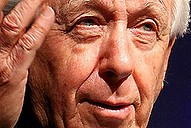Search
Democracy Links
Member's Off-site Blogs
hunger makes a poor incentive .....

It's been a tough year for the captains of industry. The galloping salary increases of pre-GFC days have slowed to a canter, The Australian Financial Review reported. But it's hard to feel sorry for, say, Westfield's Frank Lowy on a package of $16 million.
He is getting by on almost $45,000 a day. Chris Pizey, whom I met recently, is getting by on $35 a day. I wish I could bring the two together. Lowy would find Pizey to be a good bloke. He is 49, articulate, and unemployed.
Lowy, being rich, needs the incentive of escalating remuneration to keep him motivated, the theory goes. Otherwise he might head to the beach or overseas. Pizey is subject to another kind of thinking on incentives. It is considered positively unkind to shower the poor with largesse, say an extra $50 a week.
Give unemployed people a little more help and they will lapse into a demoralised state of welfare dependency from which they will never recover, welfare critics claim. Nothing less than the prod of hunger and homelessness is considered adequate motivation for the likes of Pizey.
I met Pizey recently in a city coffee shop. He was neatly dressed in clean jeans and T-shirt with hair still wet from the shower - quite an effort for someone who was homeless. Though he was indistinguishable in many ways from others in the cafe, I identified him as my interview subject because he lacked some front teeth. In Australia toothlessness is the neon sign that screams ''too poor for a dentist and always have been''.
As it evolved over coffee, Pizey's fatal career mistake had been to start work as a fencer at 16 when he arrived in Adelaide from Britain with his family. He should have got an apprenticeship as a mechanic, he reflects.
Though an unskilled manual worker, he was mostly employed over the decades, if increasingly dependent on labour hire companies who employ men, as in the Depression, on a day-by-day basis.
Things fell apart a couple of years ago after Pizey discovered his much-loved father, with whom he lived, dead of a massive heart attack.
Pizey suffered terrible grief, lost his steady job, and was evicted by the Housing Department because his name was not on the lease. Eventually he headed for Sydney, hoping for better job opportunities. But he failed to take the rent situation into account. On the Newstart Allowance of $243.40 a week even with $59 in rent assistance, it is virtually impossible to rent between the central coast and Wollongong; not if you also want to eat and to have spare change to look for work.
Faced with the choice of hunger or homelessness, Pizey opted to eat. He slept in the Sydney-Newcastle night trains or in parks.Occasionally he went to men's refuges but he didn't feel comfortable among the resident alcoholics, drug addicts and people with mental illness.
His Job Network provider helped with clothes, and he could shower in a city centre that caters to the homeless. But it was hard to look for a job - and to keep one - when you were grabbing sleep on the night trains.
In recent months, those usually aligned with the conservative side of politics have joined the Australian Council of Social Service to call for an increase in the Newstart Allowance. This week the chief executive of the Business Council of Australia, Jennifer Westacott, lent her voice to the cause.
"People cannot live on $35 a day," she said in a lecture for the Brotherhood of St Laurence. ''Entrenching them into poverty is not a pathway back into employment. It doesn't fit a story of true national wealth."
Westacott, who represents the chief executives of Australia's top 100 corporations, said if we intended to target welfare ever more tightly, "at the very least we have to make sure it's adequate".
The economist Judith Sloan, no friend of the welfare lobby, has also said that despite the costs, and the problem of disincentives, "when you start to look at the figures [on Newstart's adequacy] you'd think something has to be done". Ian Harper, picked by the former prime minister John Howard to set the minimum wage and head the then Fair Pay Commission, has also said the dole is "too low". People became desperate when their living standards declined so much. "And if they stay on (Newstart) long enough, they get depression and they're moved onto the DSP." On the disability support pension they get $130 a week more.
Leading welfare researcher Peter Whiteford, of the Social Policy Research Centre, says people on the dole are much poorer compared with the rest of the community than they were in the 1990s. This is mainly because Newstart is indexed to the CPI, not wage increases, and median household income has increased significantly since 2003. The unemployment benefit has fallen from about 46 per cent of median equivalent income in the 1990s to 35 per cent in 2009-10, well below the relative poverty line of 50 per cent.
The Prime Minister, Julia Gillard, should follow the example of Bob Hawke, the last prime minister to lift the base rate of the unemployment benefit. As for where the money will come from, surely a nation that has figured out how to incentivise the rich can figure out a better way to incentivise the poor than the whip of hunger and homelessness.
- By John Richardson at 26 Nov 2011 - 9:26am
- John Richardson's blog
- Login or register to post comments
Recent comments
7 hours 15 min ago
10 hours 11 min ago
12 hours 30 min ago
22 hours 10 min ago
22 hours 59 min ago
1 day 5 hours ago
1 day 9 hours ago
1 day 11 hours ago
1 day 12 hours ago
1 day 12 hours ago